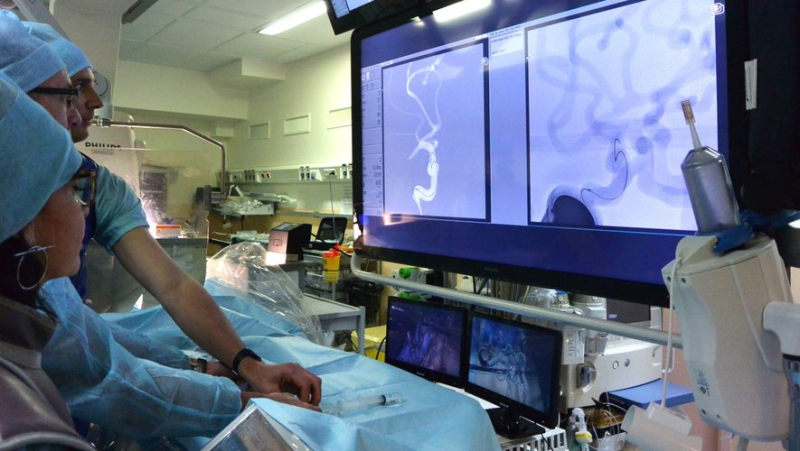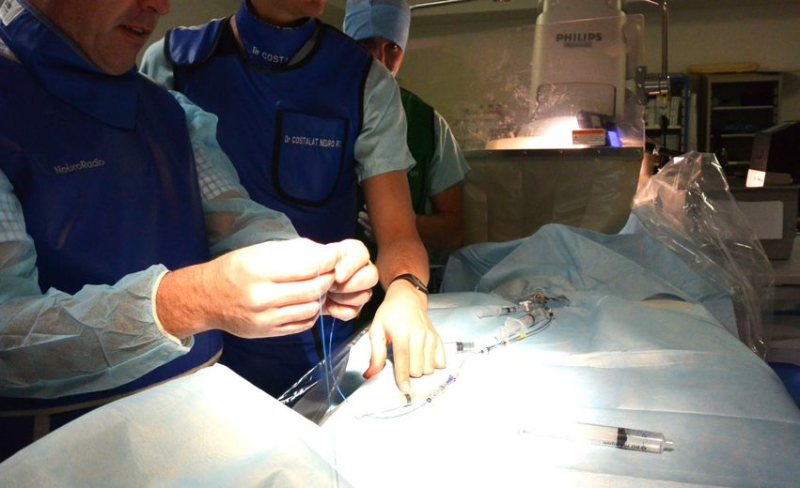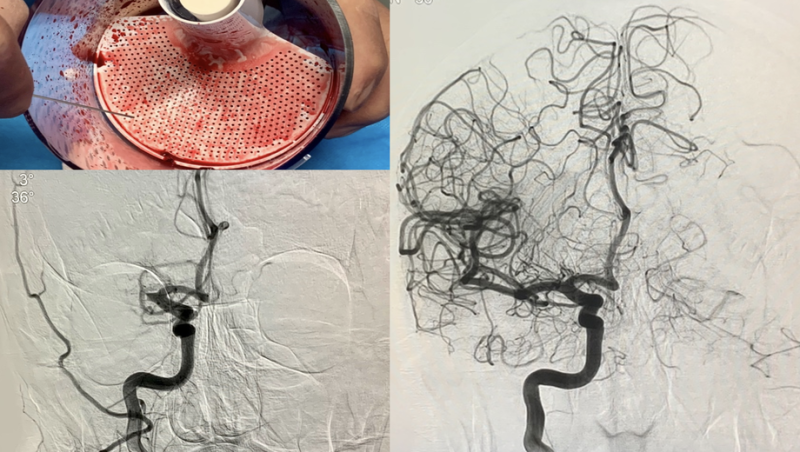“The brain that we thought was dead is not”: a study carried out at Montpellier University Hospital revolutionizes stroke care

L’équipe visualise les effets de la thrombectomie. – DR CHU DE MONTPELLIER
The team of Professor Vincent Costalat and Dr Caroline Arquizan has coordinated an international study which shows that brains heavily damaged by a stroke can "recover" with revascularization techniques previously reserved for lighter patients. It has just been published in the prestigious medical journal The New England Journal of Medicine. “The treatment of strokes will change,” assures Caroline Arquizan, neurologist.
Will stroke, a cerebrovascular accident which causes a neurological deficit due to the damage caused to the brain, experience a turning point in its treatment?? These are the perspectives that open up the team of Professor Vincent Costalat, neuroradiologist at Montpellier University Hospital, in an international study of 333 people, which is the subject of a publication, on May 8, in the prestigious medical journal The New England Journal of Medicine.
"The brain that we thought was dead is not", welcomes the& ;rsquo;team, which opens up new perspectives of recovery for patients hitherto considered condemned to a severe disability. Every year, in France, more than 110,000 people are hospitalized after a stroke, which manifests itself by difficulty speaking, numbness on one side of the body, tingling in one arm and sometimes difficulty in speaking. sight, indicates Public Health France. A third of them will die in the following year, and 70% of patients have after-effects, sometimes very serious.

In the operating room, thrombectomy.
It is for the latter that the work of the Montpellier University Hospital opens new perspectives: "Until now, we reserved the cerebral revascularization techniques for patients for whom brain imaging showed limited brain destruction. It has been shown that these people also have a chance of recovering, and of coming out with fewer after-effects", enthuses Caroline Arquizan, neurologist, study coordinator.
Patients so far deemed "irrecoverable"
Cerebral revascularization techniques, thrombectomy, have been validated since 2015. They consist of reperfusing the arteries of the brain, and open up prospects for recovery if they are carried out within seven hours following the diagnosis. AVC.
The progress is well documented, and is the subject of numerous studies. The originality of the Montpellier University Hospital was to conduct a new one, called "In EXTREMIS-LASTE", including very severe patients, hitherto judged " irrecoverable, condemned to live with hemiplegia and serious after-effects.
On 333 patients selected in Montpellier and in partner establishments, in France (26 centers), and in Spain (7 centers), under the control of Professor Costalat and Dr Arquizan, but also of Dr Bertrand Lapergue (Foch Hospital in Paris) and Professor Tudor Jovin (Cooper, University Hospital in the United States), 56% have this profile.
They also benefited from reperfusion of brain tissue, a thrombectomy.

On the left, the blocked vascular tree, on the right, the vascular tree reperfused with all its branches, “allowing the extension of the lesions to be limited”, indicates the CHU team. MONTPELLIER CHU
"We expected an improvement, but we were very surprised by the result"
"We hoped for an improvement, but we were very surprised by the result", admits Caroline Arquizan.< em>"To the great surprise of the entire scientific community, the therapeutic trial turned out to be very strongly positive with a reduction in the absolute risk of death of 20& nbsp;%, and a surprising functional improvement bringing one in five patients home after six months of rehabilitation, specifies the CHU.
Consequence: "Nearly 20 % of stroke patients who were not considered eligible for emergency revascularization treatment are available today".
"They will always have after-effects, they will not fully recover, we must not give false hope, l'' Stroke remains an emergency that requires going to the hospital immediately. But even if the symptoms are very alarming, we must not believe that all is lost. We will be able to save things for people who will not be condemned to remain bedridden and very dependent. Some of these patients manage to walk without assistance, we really see miraculous things", insists Dr Arquizan.
Another test, "IN EXTREMIS-MOSTE", has already been launched to go further. But already, practices will change.
I subscribe to read more




